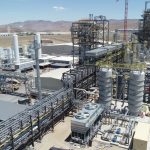British Airways has become a new investor in a round of additional funding raised by ZeroAvia towards a development programme for a 2MW hydrogen-electric powertrain for full-size regional aircraft. A total of £17.6 million ($24.3m) has been raised in a round led by Horizons Ventures, with other participation from Breakthrough Energy Ventures, Ecosystem Integrity Fund, Shell Ventures, Summa Equity and Systemiq. This brings the total private funding to over £38 million ($53m) and total funding raised by ZeroAvia since inception to £53.7 million ($74m), including a grant awarded by the UK government. The company’s initial programme aims to bring a 19-seat hydrogen-electric powered aircraft into commercial service in 2024 and a 50+ seat version by 2026. British Airways said its investment supported the airline’s net-zero emissions by 2050 commitment and to reach true zero emissions on short-haul routes by the same year. Meanwhile, sustainable fuels technology company Velocys has reached an agreement to extend the current option with British Airways for the UK waste-to-jet fuel Altalto project to March 2022. Exercise of the option would give both parties equal equity ownership of Altalto.
British Airways said its investment in ZeroAvia would help accelerate the development of a 50+ seater commercial aircraft capable of running on zero emissions hydrogen-electric power, which ZeroAvia expects to have in operation in five years’ time.
The investment follows a recent partnership between ZeroAvia and the Hangar 51 accelerator programme of BA’s parent company International Airlines Group, which identified economic, network and consumer appeal advantages of hydrogen-powered aircraft, as well as clear environmental benefits.
“Innovative zero emissions technology is advancing fast and we support the development of hydrogen as an alternative fuel source because we believe it has the potential to enable us to reach true zero emissions on short-haul routes by 2050,” said British Airways CEO Sean Doyle. “There is a huge amount of energy and excitement building around the possibilities of a zero emissions future for aviation and while there is no single solution to this challenge, we acknowledge the need for urgent action to tackle the impact flying currently has on our planet and are making progress on our journey to net zero.”
In September last year, ZeroAvia achieved the world’s first hydrogen-electric flight of a commercial-grade aircraft and has just completed a ground simulation of the complete power profile for an upcoming first cross-country flight (see video below). The ground test demonstrated a full battery shutdown in flight using the company’s fuel cell powertrain configuration, allowing for complete removal of the battery system in the next configuration of the powertrain.
ZeroAvia intends addressing various markets, initially targeting a 500-mile range, 10-20 seat aircraft by 2024 for use in commercial passenger transport, package delivery, agriculture and other modes, with the new capital infusion allowing the company to enter the 50+ seat commercial segment by 2026 and onwards to a 100-seat aircraft by 2030.
“This new funding, in conjunction with our other recent milestones, will significantly accelerate our path to zero-emission solutions for larger regional aircraft at a commercial scale,” said Val Miftakhov, CEO and founder of ZeroAvia. “With many airlines lining up and ready to make the shift to zero emissions, we expect to see wide-scale adoption of this technology. We are extremely grateful for our investors who are helping to speed up our progress and ultimately the aviation industry’s adoption of zero-emission flight.”
The company has also appointed new members to its senior team, including Christine Ourmières-Widener, who joins the board of directors with previous experience of senior leadership roles at Air France-KLM, CityJet, FlyBe and American Express Global Business Travel. Other appointments include Mike Friend, a retired Boeing Senior Technology Director and consultant for Mitsubishi Aircraft who joins the technical advisory board, and Mark Blair, a retired FedEx VP of air operations and also at Cessna Aircraft Company, with experience of package delivery applications of various sizes of aircraft.
Velocys announced in May 2020 that under a joint development agreement (JDA), British Airways and Shell would put up £1 million funding for the Altalto SAF project in north-east England and each was granted an option to take a one-third share in the equity capital of Altalto Limited. However, Shell has since pulled out of the JDA, leaving British Airways with the option of equal equity ownership of the project with Velocys.
The two partners, through subsidiary Altalto Immingham, say they intend applying for a grant under the new UK government £15 million ($20m) ‘Green Fuels, Green Skies’ funding competition to support SAF development announced last month. The results of the competition are expected to be announced by the Department for Transport (DfT) at the end of July.
“Whilst there is no guarantee the Altalto project’s application will be successful, we are delighted to see this new government initiative to support the production of SAF,” commented Velocys CEO Henrik Wareborn.
The DfT has also opened a consultation into amending the government’s Renewable Transport Fuel Obligation (RTFO) with the intention of increasing the carbon savings it achieves and expanding the scheme to include recycled carbon fuels that would “transform the commercial viability” of waste-to-fuel technology and support pioneering UK projects looking to develop SAF from household waste. Velocys said it welcomed the consultation and would be responding.
“Policy support remains critical to the establishment of UK SAF facilities but with the right support, we can enable a clean future for aviation,” said Wareborn.
Added British Airways’ Sean Doyle: “Progressing the development and commercial deployment of SAF is crucial to decarbonising the aviation industry and to meet our commitment to carbon net zero by 2050. The UK has the experience and resources needed to become a global leader in the deployment of such SAF production facilities, and we need government support to drive decarbonisation and accelerate the realisation of this vision.”
Velocys said it expected the project would be in a position to launch its front-end engineering design (FEED) phase later this year, subject to confirmed UK government policy support and the addition of new investors in the project.
Neville Hargreaves, the company’s VP Waste to Fuels, told a webinar this week that he expected SAF production at Altalto could start in 2026.
Top image: ZeroAvia’s vision of a larger hydrogen-electric powered regional aircraft












More News & Features
SAF One announces new investment and technology partners for Middle East SAF project
New initiative formed to accelerate SAF adoption and production in the Pacific Northwest
EcoCeres opens new Malaysia production facility as SAF ambition in Asia scales up
Aviation, shipping and fuel leaders convene in Rotterdam to accelerate sustainable fuels scale-up
EU SAF mandates will have to be revised, predicts French oil chief
Lessons learned from the collapse of Fulcrum BioEnergy